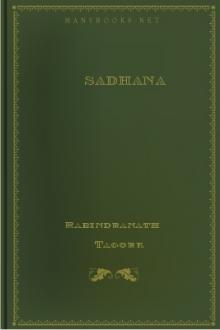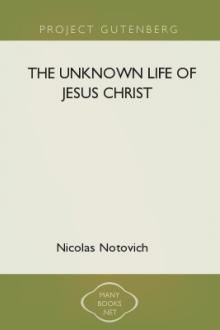Sadhana - Rabindranath Tagore (book club suggestions txt) 📗

- Author: Rabindranath Tagore
- Performer: -
Book online «Sadhana - Rabindranath Tagore (book club suggestions txt) 📗». Author Rabindranath Tagore
But a truth opens up a whole horizon, it leads us to the infinite. That is the reason why, when a man like Darwin discovers some simple general truth about Biology, it does not stop there, but like a lamp shedding its light far beyond the object for which it was lighted, it illumines the whole region of human life and thought, transcending its original purpose. Thus we find that truth, while investing all facts, is not a mere aggregate of facts—it surpasses them on all sides and points to the infinite reality.
As in the region of knowledge so in that of consciousness, man must clearly realise some central truth which will give him an outlook over the widest possible field. And that is the object which the Upanishad has in view when it says, Know thine own Soul. Or, in other words, realise the one great principal of unity that there is in every man.
All our egoistic impulses, our selfish desires, obscure our true vision of the soul. For they only indicate our own narrow self.
When we are conscious of our soul, we perceive the inner being that transcends our ego and has its deeper affinity with the All.
Children, when they begin to learn each separate letter of the alphabet, find no pleasure in it, because they miss the real purpose of the lesson; in fact, while letters claim our attention only in themselves and as isolated things, they fatigue us. They become a source of joy to us only when they combine into words and sentences and convey an idea.
Likewise, our soul when detached and imprisoned within the narrow limits of a self loses its significance. For its very essence is unity. It can only find out its truth by unifying itself with others, and only then it has its joy. Man was troubled and he lived in a state of fear so long as he had not discovered the uniformity of law in nature; till then the world was alien to him. The law that he discovered is nothing but the perception of harmony that prevails between reason which is of the soul of man and the workings of the world. This is the bond of union through which man is related to the world in which he lives, and he feels an exceeding joy when he finds this out, for then he realises himself in his surroundings. To understand anything is to find in it something which is our own, and it is the discovery of ourselves outside us which makes us glad. This relation of understanding is partial, but the relation of love is complete.
In love the sense of difference is obliterated and the human soul fulfils its purpose in perfection, transcending the limits of itself and reaching across the threshold of the infinite.
Therefore love is the highest bliss that man can attain to, for through it alone he truly knows that he is more than himself, and that he is at one with the All.
This principal of unity which man has in his soul is ever active, establishing relations far and wide through literature, art, and science, society, statecraft, and religion. Our great Revealers are they who make manifest the true meaning of the soul by giving up self for the love of mankind. They face calumny and persecution, deprivation and death in their service of love.
They live the life of the soul, not of the self, and thus they prove to us the ultimate truth of humanity. We call them Mahatmas, “the men of the great soul.”
It is said in one of the Upanishads: It is not that thou lovest thy son because thou desirest him, but thou lovest thy son because thou desirest thine own soul. [Footnote: Na va are putrasya kamaya putrah priyo bhavati, atmanastu kamaya putrah priyo bhavati.] The meaning of this is, that whomsoever we love, in him we find our own soul in the highest sense. The final truth of our existence lies in this. Paramatma, the supreme soul, is in me, as well as in my son, and my joy in my son is the realisation of this truth. It has become quite a commonplace fact, yet it is wonderful to think upon, that the joys and sorrows of our loved ones are joys and sorrows to us—nay they are more. Why so? Because in them we have grown larger, in them we have touched that great truth which comprehends the whole universe.
It very often happens that our love for our children, our friends, or other loved ones, debars us from the further realisation of our soul. It enlarges our scope of consciousness, no doubt, yet it sets a limit to its freest expansion.
Nevertheless, it is the first step, and all the wonder lies in this first step itself. It shows to us the true nature of our soul. From it we know, for certain, that our highest joy is in the losing of our egoistic self and in the uniting with others.
This love gives us a new power and insight and beauty of mind to the extent of the limits we set around it, but ceases to do so if those limits lose their elasticity, and militate against the spirit of love altogether; then our friendships become exclusive, our families selfish and inhospitable, our nations insular and aggressively inimical to other races. It is like putting a burning light within a sealed enclosure, which shines brightly till the poisonous gases accumulate and smother the flame.
Nevertheless it has proved its truth before it dies, and made known the joy of freedom from the grip of darkness, blind and empty and cold.
According to the Upanishads, the key to cosmic consciousness, to God-consciousness, is in the consciousness of the soul. To know our soul apart from the self is the first step towards the realisation of the supreme deliverance. We must know with absolute certainty that essentially we are spirit. This we can do by winning mastery over self, by rising above all pride and greed and fear, by knowing that worldly losses and physical death can take nothing away from the truth and the greatness of our soul. The chick knows when it breaks through the self-centered isolation of its egg that the hard shell which covered it so long was not really a part of its life. That shell is a dead thing, it has no growth, it affords no glimpse whatever of the vast beyond that lies outside it. However pleasantly perfect and rounded it may be, it must be given a blow to, it must be burst through and thereby the freedom of light and air be won, and the complete purpose of bird life be achieved. In Sanskrit, the bird has been called the twice-born. So too the man who has gone through the ceremony of the discipline of self-restraint and high thinking for a period of at least twelve years; who has come out simple in wants, pure in heart, and ready to take up all the responsibilities of life in a disinterested largeness of spirit.
He is considered to have had his rebirth from the blind envelopment of self to the freedom of soul life; to have come into living relation with his surroundings; to have become at one with the All.
I have already warned my hearers, and must once more warn them against the idea that the teachers of India preached a renunciation of the world and of self which leads only to the blank emptiness of negation. Their aim was the realisation of the soul, or, in other words, gaining the world in perfect truth.
When Jesus said, “Blessed are the meek, for they shall inherit the earth,” he meant this. He proclaimed the truth that when man gets rid of his pride of self then he comes into his true inheritance. No more has he to fight his way into his position in the world; it is secure for him everywhere by the immortal right of his soul. Pride of self interferes with the proper function of the soul which is to realise itself by perfecting its union with the world and the world’s God.
In his sermon to Sadhu Simha Buddha says, It is true, Simha, that I denounce activities, but only the activities that lead to the evil in words, thoughts, or deeds. It is true, Simha, that I preach extinction, but only the extinction of pride, lust, evil thought, and ignorance, not that of forgiveness, love, charity, and truth.
The doctrine of deliverance that Buddha preached was the freedom from the thraldom of Avidya. Avidya is the ignorance that darkens our consciousness, and tends to limit it within the boundaries of our personal self. It is this Avidya, this ignorance, this limiting of consciousness that creates the hard separateness of the ego, and thus becomes the source of all pride and greed and cruelty incidental to self-seeking. When a man sleeps he is shut up within the narrow activities of his physical life. He lives, but he knows not the varied relations of his life to his surroundings,—therefore he knows not himself. So when a man lives the life of Avidya he is confined within his self. It is a spiritual sleep; his consciousness is not fully awake to the highest reality that surrounds him, therefore he knows not the reality of his own soul. When he attains Bodhi, i.e. the awakenment from the sleep of self to the perfection of consciousness, he becomes Buddha.
Once I met two ascetics of a certain religious sect in a village of Bengal. “Can you tell me,” I asked them, “wherein lies the special features of your religion?” One of them hesitated for a moment and answered, “It is difficult to define that.” The other said, “No, it is quite simple. We hold that we have first of all to know our own soul under the guidance of our spiritual teacher, and when we have done that we can find him, who is the Supreme Soul, within us.” “Why don’t you preach your doctrine to all the people of the world?” I asked. “Whoever feels thirsty will of himself come to the river,” was his reply. “But then, do you find it so? Are they coming?” The man gave a gentle smile, and with an assurance which had not the least tinge of impatience or anxiety, he said, “They must come, one and all.”
Yes, he is right, this simple ascetic of rural Bengal. Man is indeed abroad to satisfy needs which are more to him than food and clothing. He is out to find himself. Man’s history is the history of his journey to the unknown in quest of the realisation of his immortal self—his soul. Through the rise and fall of empires; through the building up gigantic piles of wealth and the ruthless scattering of them upon the dust; through the creation of vast bodies of symbols that give shape to his dreams and aspirations, and the casting of them away like the playthings of an outworn infancy; through his forging of magic keys with which to unlock the mysteries of creation, and through his throwing away of this labour of ages to go back to his workshop and work up afresh some





Comments (0)